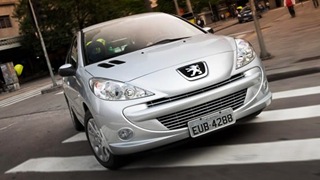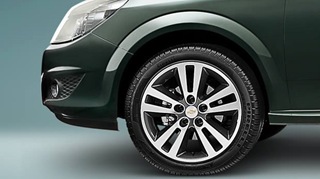Wallpaper Peugeot 207 2012
 O grupo PSA começou a fazer alterações muito interessantes na linha brasileira, como a chegada do novo sedã médio 408, mas infelizmente os segmentos compactos ainda não são os destaques. Enquanto a Citroën já apela para o custo/benefício para manter as boas vendas do C3, a Peugeot tenta repaginar o 207 mais uma vez. Ou seja, só poderemos esperar um sucessor para daqui a uns dois anos – provavelmente já será o 208 europeu.
O grupo PSA começou a fazer alterações muito interessantes na linha brasileira, como a chegada do novo sedã médio 408, mas infelizmente os segmentos compactos ainda não são os destaques. Enquanto a Citroën já apela para o custo/benefício para manter as boas vendas do C3, a Peugeot tenta repaginar o 207 mais uma vez. Ou seja, só poderemos esperar um sucessor para daqui a uns dois anos – provavelmente já será o 208 europeu.
A mudança exterior mais chamativa foi que as barras de proteção dianteira e traseira agora vêm na cor do veículo exceto para a Escapade, solução que pode causar estranhamento em algumas cores. Afinal de contas, peças tão grandes como estas geravam melhor efeito visual com o contraste do preto fosco. Fora que ao estarem com a mesma pintura da carroceria elas acabaram perdendo a função de proteger os extremos do carro…
 As versões mais caras também ganharam leves retoques nas lanternas. A cabine de todos recebeu instrumentos com fundo branco e novos revestimentos para os bancos. Os motores, como sempre, ficaram intactos. E como a Peugeot não cansa de tentar refinar seu combalido modelo, a versão de entrada X-Line saiu de linha, ficando como mais barata a XR hatchback de três portas, por R$ 35.790.
As versões mais caras também ganharam leves retoques nas lanternas. A cabine de todos recebeu instrumentos com fundo branco e novos revestimentos para os bancos. Os motores, como sempre, ficaram intactos. E como a Peugeot não cansa de tentar refinar seu combalido modelo, a versão de entrada X-Line saiu de linha, ficando como mais barata a XR hatchback de três portas, por R$ 35.790.
Falando em versões, a XRS está presente nos hatch, Passion e SW e ganhou vidros elétricos dianteiros, computador de bordo e sensores crepuscular e de chuva, tudo de série. As versões com câmbio manual agora também podem ter airbag duplo e freios ABS. E a versão de topo, XS, incorporou de série o sistema de som multimídia. Quanto à picape Hoggar, sua básica X-Line agregou direção hidráulica e protetor de caçamba, entre outros, e sua Escapade ganha computador de bordo.
Like? Peugeot 207 2012 for wallpaper? Shar this image to Peugeot 207 2012 for your friend.



























































